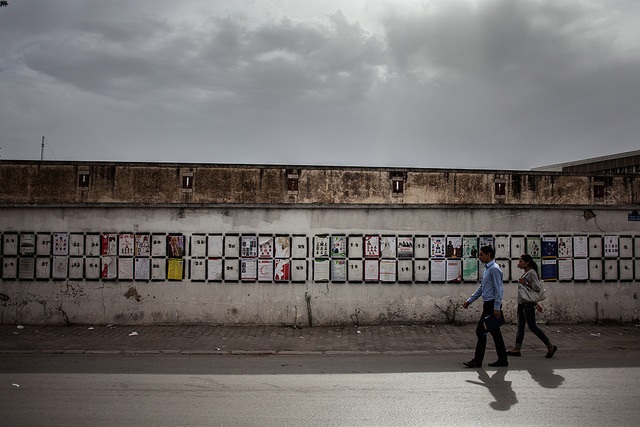 The transfer of power has been a confounding challenge in modern Arab politics. Tunisia’s success is again the exception. Last year, Tunisia’s Ennahda became the first Islamist party in the Arab world to step down peacefully, part of a package compromise with secular opposition parties to adopt the constitution. In the latest round of legislative elections, Ennahda lost its parliamentary plurality. Nidaa Tounes, which represents the secular modernism of former president-for-life Habib Bourguiba, now holds the plurality. It is hard to imagine how two parties could win wide support despite offering such different visions for Tunisia’s future. Coalition building is a touchstone of early success in transitions to democracy: who will be in and who will be out, and what incentives will key players need to have a stake in the outcome?
The transfer of power has been a confounding challenge in modern Arab politics. Tunisia’s success is again the exception. Last year, Tunisia’s Ennahda became the first Islamist party in the Arab world to step down peacefully, part of a package compromise with secular opposition parties to adopt the constitution. In the latest round of legislative elections, Ennahda lost its parliamentary plurality. Nidaa Tounes, which represents the secular modernism of former president-for-life Habib Bourguiba, now holds the plurality. It is hard to imagine how two parties could win wide support despite offering such different visions for Tunisia’s future. Coalition building is a touchstone of early success in transitions to democracy: who will be in and who will be out, and what incentives will key players need to have a stake in the outcome?
The challenge of coalition building in Tunisia stands in for religious tensions felt across the Arab world. Instead of the military authoritarianism offered by Egypt or the ultra-radical extremism advanced by Islamic State (or ISIS or ISIL) militants, debates over political and religious identity have more nuance in Tunisia. The rift between Nidaa Tounes and Ennahda is emblematic. Beji Caid Essebsi, the 87-year-old president of Nidaa Tounes, represents a generation of Tunisian politicians that came to power by virtue, in part, of the exclusion of Islamist parties. Ennahda’ s exiled leadership—chiefly Rached Ghannouchi, its president—has returned after the revolution with the goal of bringing Islam back into the public sphere. These competing visions for what comes next were at play in the elections.
The task of building a governing coalition will fall to Nidaa Tounes as the plurality party, as the constitution stipulates. Preliminary results show that Nidaa Tounes won around 39 percent of the seats while Ennahda won 32 percent. The remaining seats are divided amongst socialists, centrists, and independents with unclear ideologies and little affinity for either Nidaa Tounes or Ennahda.
The presidential election, scheduled to take place over two rounds in November and December, introduces a critical unknown variable in the parliamentary negotiations. Ennahda decided not to run a presidential candidate, instead eyeing a leadership role in a coalition government. Nidaa Tounes, by contrast, has associated itself with Bourguiba’s strong presidentialism. Essebsi has emerged as one of the most dynamic and popular presidential candidates. A Nidaa-led coalition and an Essebsi presidency would make Ennahda nervous, giving them a strong incentive to join a governing coalition before the presidential elections.
There are rumors that Ennahda and Nidaa Tounes had a deal, in which Ennahda traded a spot in the government for a pledge not to run for the presidency. The speculations have sparked intense criticism that the two parties, if such an agreement exists, have robbed voters of the chance to determine the shape of their own government. Such a power-sharing arrangement would seem, however, to implement the vision of the constitution, which deliberately balances executive power between the president and the prime minister.
Nidaa’s supporters are demanding that the party form a coalition without Ennahda. This seems a likely outcome, but Nidaa will need at least two other parties in any case. Such a coalition would be weak, giving Nidaa Tounes a strong incentive to consolidate executive power around the presidency. The constitution’s provisions on executive power sharing are complicated. Such a move would be a cause for concern for Ennahda’s leadership and its supporters, who fear that Bourguiba-inspired presidentialism might railroad the safeguards against executive overreach they negotiated into the constitution.
Another interpretation of Ennahda’s decision not to run for the presidency is that it is playing the long game. Ennahda’s leaders, the vanguard of their generation of Islamic democrats, were in exile for decades until 2011. They are looking to build the next generation of party leaders who can combat the undercurrents of extremism that are as antithetical to their views as those of any other party. The electoral numbers are soft: Ennahda won around 1.5 million votes in 2011 and less than 1 million on Sunday. Voters are not entrenched in their political preferences, and Nidaa could fall victim to the same precipitous drop in the next elections. A tentative electorate might begin to feel betrayed by a process that drives parties to seek absolute control. Nidaa Tounes would be wise to share in the burdens of governing.
Ennahda’s leadership in drafting a genuinely progressive constitution proved their commitment to governing by consensus. The continued success of Tunisia’s transition might very well depend on the extent to which the winners of these elections continue to adhere to principles of pluralism.
Duncan Pickard is a fellow at the Rafik Hariri Center for the Middle East and a graduate student in law at Stanford University.
Daniel Tavana is a PhD student in the Department of Politics at Princeton University.
Image: (Photo: Flickr/Heinrich-Böll-Stiftung)
